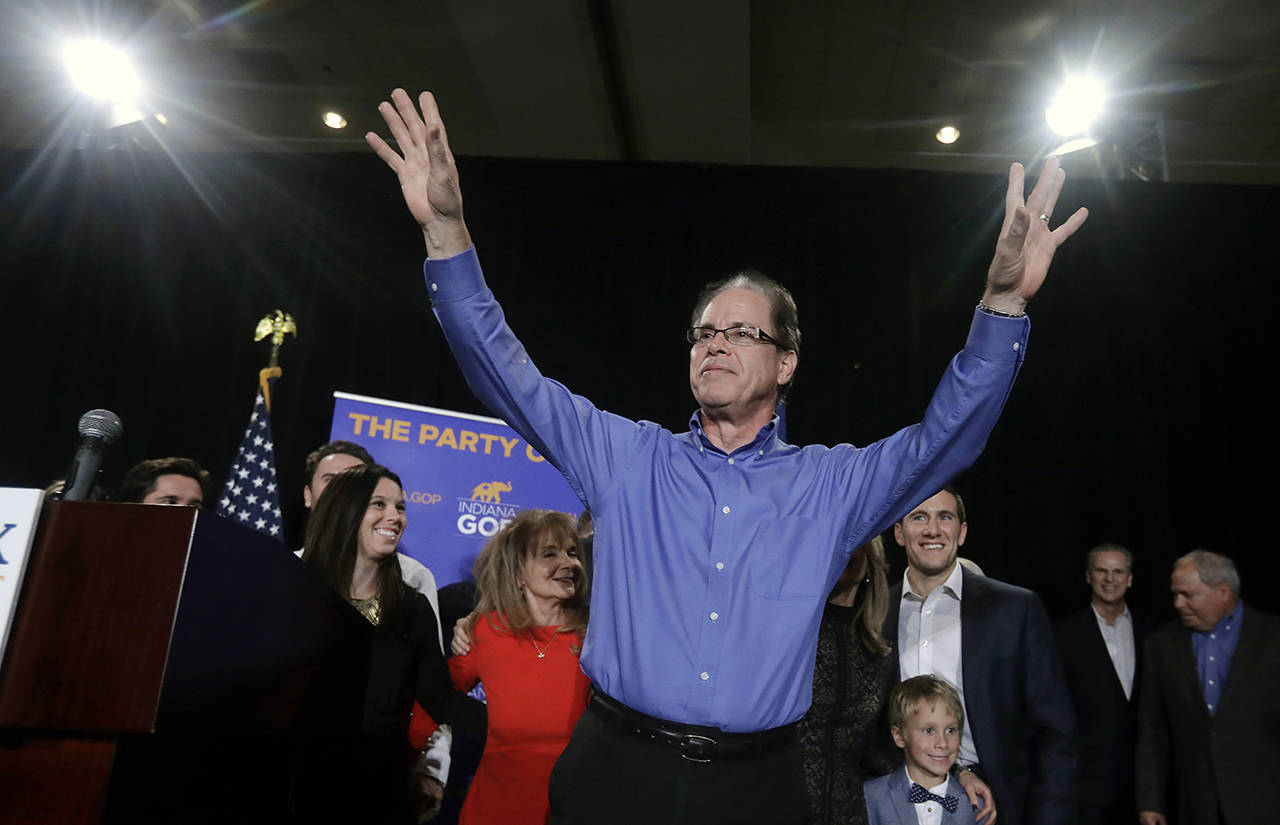By Alan Fram / Associated Press
WASHINGTON — Republicans retained control of the Senate on Tuesday, ousting Democratic incumbents in Indiana and North Dakota and handing President Donald Trump a triumph by ensuring they will remain as guardians of his conservative agenda for two more years.
Despite Trump’s deeply polarizing effect on voters, the GOP harnessed his rock-solid popularity with hard-right voters in rural, deep-red states. They held onto seats in the South, Midwest and West and ensured at least a 50-50 Senate — enough to give Republicans control because Vice President Mike Pence as president of the Senate would tip the balance to the GOP.
Republicans paved their path to victory by defeating Democrats Joe Donnelly of Indiana and Heidi Heitkamp of North Dakota. They also held on to competitive seats in Texas, where Sen. Ted Cruz fended off Rep. Beto O’Rourke, the well-financed liberal darling, and in Tennessee, where Rep. Marsha Blackburn prevailed.
The GOP Senate victory was magnified because Democrats stood a solid chance of wresting control of the House from Republicans.
That would give the Senate the role of blocking House-passed Democratic initiatives on everything from health care to the potential repeal of tax cuts on the wealthy that the GOP enacted last year.
It would also leave the Senate as the showcase for the GOP’s goals of tax and spending cuts, trade, immigration restrictions, curbs on Obama’s health care law and judicial nominations.
Republicans entered the night commanding the Senate only narrowly, 51-49. But a crucial piece of math was in their favor Tuesday: The Democrats and their two independent allies were defending 26 seats, Republicans just nine.
Blackburn, a conservative who is also an ardent Trump backer, defeated former Tennessee Gov. Phil Bredesen, 74. Bredesen had promised a bipartisan approach if elected and had won the endorsement of music star Taylor Swift.
Heitkamp lost to GOP Rep. Kevin Cramer, whom Trump persuaded to seek the Senate seat. Heitkamp was hurt late in her campaign by an ad that mistakenly named some women as victims of sexual abuse.
The night’s news wasn’t completely disastrous for Democrats.
Democratic Sen. Joe Manchin was re-elected in West Virginia, a state Trump captured by 42 percentage points in his 2016 election triumph. Democratic incumbents also prevailed in Ohio, Pennsylvania and Wisconsin, Midwestern states that Trump carried narrowly two years ago.
Overall, Democrats were defending seats in 10 states that Trump took in 2016, including five he won by at least a huge 19 percentage points. Trump prevailed in Indiana by 19 points.
Tuesday’s midterm elections were among the most bitter in years.
Democrats’ longshot prospects for capturing a Senate majority were pinned on expectations that their supporters, roused by revulsion toward Trump, would surge to the polls. Fueling their intensity have been Trump’s anti-immigration rhetoric and policies, his efforts to dismantle health care protections enacted under President Barack Obama and the #MeToo movement’s fury over sexual harassment.
“Ever since President Trump has been in office, it has just been not the country that I am used to or that I thought I would be in,” said Sarah Roth, 22, a Democratic voter from Minnetonka, Minnesota. “And so this really was my opportunity to help this country in changing who is making the decisions.”
Democrats also had history on their side: 2002 was the only midterm election in the past three decades when the party holding the White House gained Senate seats.
Republicans were banking on those dynamics being offset by a vibrant economy and by a president whose insult-laden approach to political discourse was as stirring for conservative voters as it was infuriating to liberals.
Trump’s racially tinged anti-immigrant rhetoric, while unpopular among college-educated urban and suburban voters, seemed helpful in deeply conservative areas.
“I believe he values immigration, but he wants to make sure we’re safe,” said Tina Newby of Wetland, Michigan, a GOP voter. “I like the fact that he is not a politician, and I forgive some of the socially incorrect or politically incorrect things that he says.”
With so much at stake, Trump campaigned in over a dozen states with Senate elections since Labor Day, visiting some multiple times. He himself has characterized the election as a referendum on his presidency.
AP VoteCast, a national survey of the electorate conducted by The Associated Press, highlighted the effect Trump was having on voters. Nearly 4 in 10 said they were casting ballots to express opposition to him, while just 1 in 4 said their vote was an expression of support for the president.
In other results, Vermont independent Sen. Bernie Sanders and Democrats Elizabeth Warren of Massachusetts, Kirsten Gillibrand of New York and Minnesota’s Amy Klobuchar were easily re-elected. Along with Sherrod Brown, a pro-labor lawmaker re-elected in Ohio, the four are considered potential 2020 Democratic presidential hopefuls.
GOP hopes of gaining a seat from New Jersey were dashed when Democrat Sen. Bob Menendez won a third Senate term. Menendez won in the heavily Democratic state despite a federal bribery indictment that prosecutors dropped this year after a mistrial.
Also victorious was Republican Mitt Romney, the vanquished 2012 GOP presidential candidate who grabbed the Utah seat being vacated by the retiring GOP Sen. Orrin Hatch. Virginia Democrat Tim Kaine, his party’s defeated 2016 vice presidential candidate, won re-election to the Senate.
Amid the recent rash of letter bombs and the Pittsburgh synagogue massacre, Trump issued alarming and often unfounded warnings about caravans of migrants crossing Mexico toward the U.S., blaming Democrats, without evidence, for the threat he claimed they pose.
AP VoteCast is a nationwide survey of more than 120,000 voters and nonvoters conducted for the AP by NORC at the University of Chicago
AP reporters Jeff Baenen in Minnetonka, Minnesota, and John Flesher in Traverse City, Michigan, contributed.
Talk to us
> Give us your news tips.
> Send us a letter to the editor.
> More Herald contact information.

























